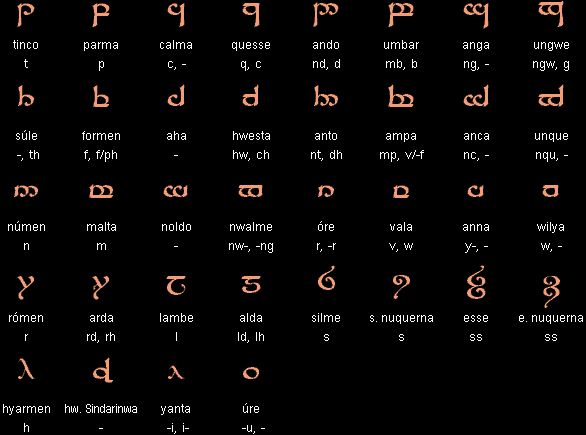|
Origin
J.R.R. Tolkien created many languages throughout his life.
He wrote in one of his letters that the tales of Middle-earth
(The Hobbit, The Lord of the Rings, The Silmarillion, etc)
grew from these languages, rather than the languages being
created for use in the stories.
Tolkien also created a number of different alphabet to write
his languages - Tengwar, or Feanorian letters, is the one
which appears most frequently in his work. The way the vowels
are indicated in Tengwar resembles Tibetan
and other Brahmi-derived scripts.
Notable features
- Written from left to right in horizontal lines.
- Tengwar is written is a number of different ways known
as "modes". For example there is a Quenyan mode,
a Sindarin mode and even an English mode. The phonetic values
of the consonants (tengwa) and the ways vowels are indicated
varies from mode to mode.
- Vowels are indicated by diacritics (tehtar) which appear
above the consonant which precedes them (in Quenyan mode)
or above the consonant which follows them (in Sindarin mode).
Long vowels are indicated by an additional dot below the
consonant to which they are attached. When vowels stand
on their own or come at the beginning of a word, the diacritics
appear over a special vowel holder.
- Consonants are doubled by adding a wavy line below them.
- When followed by a vowel, the letters /s/ /ss/ and /r/
are written with the tengwa silme nuquerna, esse nuquerna
and rómen respectively. Otherwise these letters are
written with the the tengwa silme, esse and óre.
- When the letter /s/ follows another consonant it is written
with a little downward hook
Used to write
A number of different languages of Middle-Earth, such as:
Quenya, Qenya or High-Elven, the most prominent language
of the Amanya branch of the Elvish language family. Tolkien
complied the "Qenya Lexicon", his first list of
Elvish words, in 1915 at the age of 23 and continued to refine
the language throughout his life. It is based mainly on Finnish,
but also partly on Greek and partly on Latin.
Sindarin, the language of the Grey-elves or Sindar.
Tolkien based Sindarin on Welsh and originally called it gnomish.
Sylvan, Westron, etc
Tengwar can also be used to write English,
Welsh,
Scottish
Gaelic, Swedish, Polish, Esperanto and a variety of other
languages.
Consonants
The phonetic values on the left are for the Quenyan and
the ones on the right are for the Sindarin mode (if different)

Vowel and diphthongs
In languages where /u/ is more common than /o/, the diacritics
for /o/and /u/ are swapped around. The diacritic shown for
/o/ below is used for whichever of these sounds is more common
in a particular language as it's easier to write.
Quenyan mode

Sindarin mode

Punctuation marks

Numerals

Sample (Quenya)

Sample (Sindarin)

Links
Free Tengwar fonts
http://www.geocities.com/fontwizard/tengwar
http://hem.passagen.se/mansb/at
http://www.gis.net/~dansmith/fonts
http://babel.uoregon.edu/yamada/fonts/tolkien.html
Writing Quenya, Sindarin or Swedish with Tengwar, by Per
Lindberg
http://forodrim.letsrock.nu/daeron/md_teng_primers.html
How to write Polish with Tengwar (in Polish)
http://www.elvish.org/gwaith/tengwar_polski.htm
How to write Esperanto with Tengwar
http://www.tuxedo.org/~esr/tengwar/esperanto-tengwar.html
České tengwar - How to write Czech with Tengwar
(in Czech and German)
http://tengwar.szm.sk/ct/
The Elvish Linguistic Fellowship - an international organization
devoted to the scholarly study of the invented languages of
J.R.R. Tolkien: http://www.elvish.org
Ardalambion - a site about the Tolkien's invented languages
http://www.uib.no/People/hnohf/
Tolkien's Middle-earth alphabets, by Dan Smith
http://ring-lord.tripod.com/alpha.html
A taste of Elvish - Quenya and Sindarin vocabulary
http://www.uib.no/People/hnohf/vocab.htm
Tengwar Textbook - explains how to write English, Sindarin,
and Quenya with Tengwar
http://www.geocities.com/tengwar2001/
[top]
|





